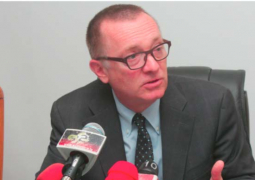The Gambia National Bureau of Ecowas Brown Card Scheme recently conducted a two-day seminar geared towards beefing up understanding of the country’s insurance practitioners about the Scheme and the new secured brown card, which takes effect from January 1, 2012.
The training, held at the secretariat of the Insurance Association of The Gambia (IAG) in
“The training is designed to acquaint motor and claims managers with the Ecowas Brown Card Insurance Scheme because these are the people who deal with the public as they are the ones who sell the card and handle claims that come in,” said Ebou L. Bittaye, chairman of the Gambia National Bureau.
The Ecowas Brown Card allows the free movement of people and goods within the Economic Community of West African States (ECOWAS). The card provides compensation for victims of motor vehicle accidents, which may occur while travelling within the sub-region. It also provides insurance cover for third-party liability risks relating to accidents resulting in death and/or bodily injury and property damage.
Mr Bittaye, who is also the managing director of Global Security Insurance Company Limited, said: “Training is a very important component of the insurance profession as it helps us to broaden and refresh our mind as well as help us to adapt to changes thereby making us versatile, dynamic and by extension impact positively in our overall performance.”
“This training is a welcome initiative by the national bureau,” said Mr Dawda Sarge, president of the IAG. “The training is to re-orientate the participants; we are not saying they don’t know about the brown card. This training is simply because we need to be properly oriented; we need to be properly sensitised as to what the brown card talks about, its importance and, of course, to understand why the protocol dictates its introduction.”
The brown card insurance scheme was established by protocol A/P1/5/82 by the ECOWAS Commission and signed by Heads of State of member countries on 29 May 1982 in
Mr. Sarge, who is also the managing director of Prime Insurance Company, said the training is the second step, nationally, for the introduction of the new card. The first step, he explained, was the publication of articles in newspapers about the new card, which was done some three weeks ago.
He said the brown card is the most successful initiative of the sub-region and said to be one of the most successful instruments for integrating Ecowas.
For his part, Henry Jawo, secretary general of the National Bureau of Ecowas Brown Card, urged the participants to ask questions and clarify any doubt they might have with regard to brown card in order to make their operations very easy.
Previous speakers commended the Gambia national bureau under the leadership of Mr. Jawo for coming up with “this wonderful training package”.
The Gambia has made a very good impact within the sub-region, as far as the brown card is concerned, as Mr. Jawo is currently representing the country at the highest level, which is the executive board of the brown card scheme, the highest decision-making board with regard to brown card.
He said the new brown card would certainly help in strengthening, fast-tracking and simplifying the process for claims settlements.
The new card is to be introduced in January 2012 to replace the old card, which could be forged easily, as in many instances fake cards have been discovered in the region. This necessitated the introduction of a new card with improved security features. The new card has security features embedded in it, which are not visible by naked eyes.
Delivering the vote of thanks on behalf of participants at the training, Marian Gomez of the International Insurance Company lauded the national bureau for coming up with the initiative and prayed for the success of the new brown card.
Read Other Articles In Article (Archive)
Lt. Col Lamin Sanneh is new State Guard Commander
Jul 16, 2012, 1:40 PM
Lang Conteh’s trial yet to proceed
Aug 12, 2014, 9:35 AM


